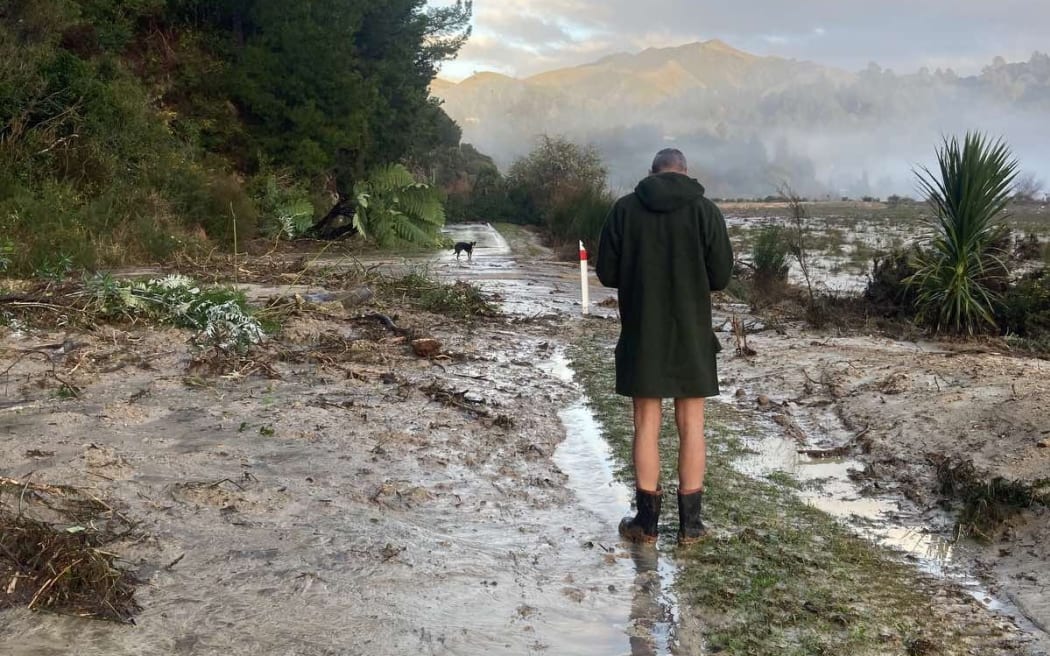
Recent floods across Tasman, Nelson and Marlborough have caused major disruption. Homes were damaged, roads cut off, orchards flooded and families displaced. Yet even in the chaos, communities stepped up with care and kindness.
St Barnabas Church in Riwaka, a small congregation among orchards and farmland, kept gathering, praying and supporting one another. While the church building was safe, many in the parish were affected – road closures, muddy properties, and even a car stuck in the lawn after Sunday worship became a picture of community care.
One local orchard saw floodwaters sweep through its packhouse again. But neighbours showed up. Locals helped with cleanup, businesses offered free accommodation, and meals were delivered to those in need. In hardship, love overflowed.
This is what it means to love our neighbour.
Jesus said, “Love your neighbour as yourself” (Mark 12:31). In Riwaka, that looked like muddy boots, shared meals and quiet prayers. It showed up in practical help and spiritual encouragement, grounded in faith that doesn’t avoid suffering but meets it with compassion.
Prayer has been a steadying force. It centres us in Christ and reminds us to lift up those who are hurting. If you’re wondering how to help – start with prayer. Then pick up the phone. Let people know they’re on your heart. A simple message can mean the world.
St Barnabas may be small, but its heart is big. As the waters recede, one truth remains: with Christ, loving our neighbour is how we weather the storm.
Thanks to Chris and Sheila Budgen and Joan Fraser for their input.
Check out other articles in the
series below.
More articles in the
series are to come.
We have invited these writers to share their experiences, ideas and opinions in the hope that these will provoke thought, challenge you to go deeper and inspire you to put your faith into action. These articles should not be taken as the official view of the Nelson Diocese on any particular matter.

Recent floods across Tasman, Nelson and Marlborough have caused major disruption. Homes were damaged, roads cut off, orchards flooded and families displaced. Yet even in the chaos, communities stepped up with care and kindness.
St Barnabas Church in Riwaka, a small congregation among orchards and farmland, kept gathering, praying and supporting one another. While the church building was safe, many in the parish were affected – road closures, muddy properties, and even a car stuck in the lawn after Sunday worship became a picture of community care.
One local orchard saw floodwaters sweep through its packhouse again. But neighbours showed up. Locals helped with cleanup, businesses offered free accommodation, and meals were delivered to those in need. In hardship, love overflowed.
This is what it means to love our neighbour.
Jesus said, “Love your neighbour as yourself” (Mark 12:31). In Riwaka, that looked like muddy boots, shared meals and quiet prayers. It showed up in practical help and spiritual encouragement, grounded in faith that doesn’t avoid suffering but meets it with compassion.
Prayer has been a steadying force. It centres us in Christ and reminds us to lift up those who are hurting. If you’re wondering how to help – start with prayer. Then pick up the phone. Let people know they’re on your heart. A simple message can mean the world.
St Barnabas may be small, but its heart is big. As the waters recede, one truth remains: with Christ, loving our neighbour is how we weather the storm.
Thanks to Chris and Sheila Budgen and Joan Fraser for their input.
Check out other articles in the
series below.
More articles in the
series are to come.